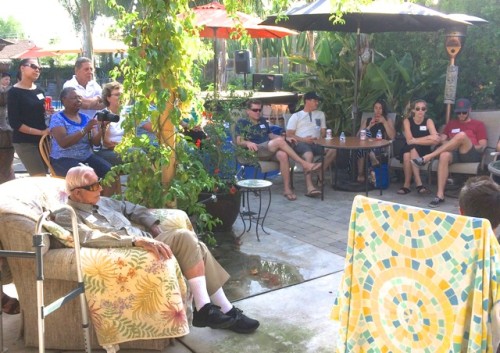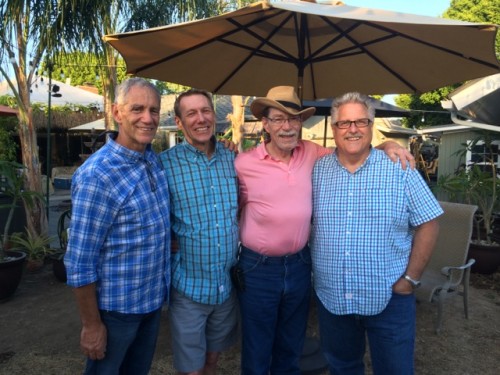 If you hadn't noticed, we Americans value individualism. A lot!
Funny thing is, we also flock to the latest fad. It doesn't seem to matter what it is—styles of clothing, digital gadgets, celebrities, cars, or whatever is trending on Twitter or gone viral on YouTube.
If you hadn't noticed, we Americans value individualism. A lot!
Funny thing is, we also flock to the latest fad. It doesn't seem to matter what it is—styles of clothing, digital gadgets, celebrities, cars, or whatever is trending on Twitter or gone viral on YouTube.
As a society, we can be pretty self-contradictory, especially those of us called Christians.
Fellowship, who needs it?
As a pastor, I would hear from people how hypocritical the church is, as if all churches are the same. In the past, I heard this from people who weren't interested in going to church. Now, I hear it from people who are in churches, or have given up on church altogether.
Why is there such discontent with the church today?
Are there legitimate reasons for this discontent? Yes, the list gets pretty specific and lengthy. I get all that. I've read various blogs and heard lots of opinions, and even agree with some of it.
But what if all the discussion is missing the point?
I haven't given up on the church, even if I'm not happy with much of what I see. It isn't so much what I see currently, trends come and go. I'm concerned about what I don't see.
Generations of blessing
 Yesterday, a few generations of church family gathered together to celebrate. The ages ranged from 93 years to five months old. Our family came of age in the early to mid-seventies in a church that doesn't exist by name. However, it still exists.
Yesterday, a few generations of church family gathered together to celebrate. The ages ranged from 93 years to five months old. Our family came of age in the early to mid-seventies in a church that doesn't exist by name. However, it still exists.
We came to know each other as we gathered for worship at a small retreat ministry and church. It was located on a lone road in the Southern California desert, but you'd have to be looking for it to find it.
A vibrant church body developed and grew as we grew spiritually and bonded as family. It was not all sweetness and joy.
These relationships, which endured over decades, developed in spite of our personalities and quirks.
We served together as we worshipped together. We rejoiced in God's goodness in our lives, and fought through difficult times. No, I mean we fought. Not fistfights, but we had lots of disagreements, arguments, and hurt feelings. But we stuck together and grew in a genuine love, the kind Jesus talked about in John 13:34-35.
Fellowship or Community?
I'm intrigued by how the word community is used in so many applications. It applies to various groups with some common interest or focus, including businesses, nations, and social movements. Social media communities are big and growing, though more virtual than real.
We knew real community, even on the backside of the desert. Several of us lived in a communal setting on the retreat site. In those days, we only had enough to make it week to week.
Even when we wanted to leave, we couldn't. We couldn't afford it, and we couldn't afford to give up on each other.
This is what I don't see too often in churches today. I'm not saying it doesn't exist at all, I know it does in small pockets scattered around our nation. But things have changed, and not for the good.
We Americans are a self-contradictory nation. We love our individuality. We celebrate it! Yet, we fall in step with fads and fancies, like lemmings running over a cliff. That cliff is a desperate search for belonging and meaning in this life.
Back then it was different, or was it?
 It's easy to look back on a time with nostalgia and long for the good ol' days. But most of that is selective memory.
It's easy to look back on a time with nostalgia and long for the good ol' days. But most of that is selective memory.
We worked together on the retreat center, and as a church. We served others when it hurt to keep doing it, long after it was fun and meaningful in some spiritual sense.
It wasn't a job. We were called to serve together in one place, as one family.
Why did we do it? It wasn't because of our love for each other, but our love for Jesus.
Yes, I know, it sounds too simplistic, but that's how it was "back then." It wasn't just being a part of something bigger than ourselves in some psychological sense.
We were joined together by our commitment to Jesus, which included commitment to one another.
From time to time, when frustrated or fed up with each other, we would joke, "It's just you and me, Jesus!" But we knew that wasn't true.
Our relationship with the Lord was tied to our relationship with one another. They were entwined, inseparable. Our relationship with God deepened as our relationships with each other grew.
We didn't stay in one place and one state
 God's purpose wasn't served by all of us staying in some supposed blissful state in one location. We served Jesus, and He equipped us for other ministry in other places.
God's purpose wasn't served by all of us staying in some supposed blissful state in one location. We served Jesus, and He equipped us for other ministry in other places.
Some of us went out to plant churches in other places, and those church bodies exist today.
Some of us were sent out to other nations, where we served people of another culture and language.
We served in these places the same way we learned to serve as family on the backside of a Southern California desert.
We were nothing special as individuals, but we experienced something special.
We were not alone then. Many other similar communities of believers sprung up like ours. And all over the world, other similar church families exist.
Now what?
What about you? Have you experienced community like ours?
Maybe the problem isn't the church or others. Pardon my sarcasm... "just sayin'," maybe the problem starts with you.
The community my true friends and I experienced was not based on individualism, but commitment.
We are all still individuals, and we still have the capacity to irritate each other. But our love for Jesus and for one another kept us together over the years, in spite of the physical distance that time and location brought.
If you want meaningful church community, it takes commitment. It takes a love for Jesus that involves a love for others, as Jesus spoke of in John 13:34-35.
I'd recommend a slow read of the whole chapter, when you get the time. And you'll need to make the time. Because—I'm just sayin'—real community requires real commitment.



